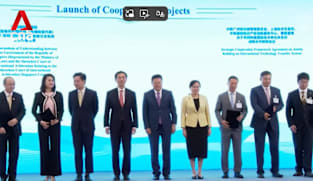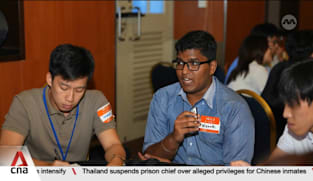Committee of Supply 2024 debate, Day 3: Chan Chun Sing on redefining success and redesigning education
To stay ahead and prepare the next generation to learn for life, Singapore must evolve its vision for education, said Education Minister Chan Chun Sing. This vision to redefine success and redesign education must cover three parts and must involve parents and industries, he said in Parliament on Friday (Mar 1). Firstly, education must be seen as a continuing journey - to learn not just in the first 15 years in school, but throughout the next 50 years of our lives. Mr Chan said the Government will continuously invest in Singaporeans to help them do well. This includes encouraging Institute of Technical Education graduates to further their studies - a S$10,000 Central Provident Fund top-up will be given to those above 30 for diploma programmes when they graduate. This can give them a headstart to buy their first home or save for retirement. There will also be a S$5,000 top-up in their post-secondary education accounts when they enrol in a diploma programme this year. Those younger than 40 can use their SkillsFuture Credit to offset their course fees. Those aged 40 and above who have left school for a longer period of time can use the S$4,000 SkillsFuture Credit for a skills reboot. The top-up can be used for over 7,000 full-time and part-time courses with better employability outcomes. “In total, our lifetime commitment to help an individual will be around S$300,000 or higher, not counting the Training Allowance of up to S$72,000. While the exact amount may differ for different pathways, the concept is similar - continuous investments for the next 50 years beyond the school rather than just the first 15 years in school,” said Mr Chan. He said the SkillsFuture Level-Up Programme will cost the Government around an additional S$100 million each year and more if there is stronger take-up. “This is a significant investment and commitment by the Government and it underscores our commitment to SkillsFuture as a key pillar of our social compact,” he said. Mr Chan said the success of the SkillsFuture movement is about whether Singaporeans have the confidence and competence to seize new career opportunities and tackle the future, and whether enterprises are well-positioned to capture new business opportunities because they have the manpower and the quality of manpower required. The second part in redesigning education involves celebrating diverse strengths and talents for collective resilience, said Mr Chan. He said the Government will improve the balance of academic and non-academic Edusave awards and increase the number of these awards to recognise 21st Century Competencies and life skills. An additional 21,000 students could receive an award every year. The third part in redesigning education calls for collective efforts where students learn not just in schools and from teachers, but from the community, society and even in the virtual world, said Mr Chan. He pointed out that change is not easy, especially if it involves reshaping perspectives and redefining success. "But change will be impossible if we do not try,” he said.
To stay ahead and prepare the next generation to learn for life, Singapore must evolve its vision for education, said Education Minister Chan Chun Sing. This vision to redefine success and redesign education must cover three parts and must involve parents and industries, he said in Parliament on Friday (Mar 1). Firstly, education must be seen as a continuing journey - to learn not just in the first 15 years in school, but throughout the next 50 years of our lives. Mr Chan said the Government will continuously invest in Singaporeans to help them do well. This includes encouraging Institute of Technical Education graduates to further their studies - a S$10,000 Central Provident Fund top-up will be given to those above 30 for diploma programmes when they graduate. This can give them a headstart to buy their first home or save for retirement. There will also be a S$5,000 top-up in their post-secondary education accounts when they enrol in a diploma programme this year. Those younger than 40 can use their SkillsFuture Credit to offset their course fees. Those aged 40 and above who have left school for a longer period of time can use the S$4,000 SkillsFuture Credit for a skills reboot. The top-up can be used for over 7,000 full-time and part-time courses with better employability outcomes. “In total, our lifetime commitment to help an individual will be around S$300,000 or higher, not counting the Training Allowance of up to S$72,000. While the exact amount may differ for different pathways, the concept is similar - continuous investments for the next 50 years beyond the school rather than just the first 15 years in school,” said Mr Chan. He said the SkillsFuture Level-Up Programme will cost the Government around an additional S$100 million each year and more if there is stronger take-up. “This is a significant investment and commitment by the Government and it underscores our commitment to SkillsFuture as a key pillar of our social compact,” he said. Mr Chan said the success of the SkillsFuture movement is about whether Singaporeans have the confidence and competence to seize new career opportunities and tackle the future, and whether enterprises are well-positioned to capture new business opportunities because they have the manpower and the quality of manpower required. The second part in redesigning education involves celebrating diverse strengths and talents for collective resilience, said Mr Chan. He said the Government will improve the balance of academic and non-academic Edusave awards and increase the number of these awards to recognise 21st Century Competencies and life skills. An additional 21,000 students could receive an award every year. The third part in redesigning education calls for collective efforts where students learn not just in schools and from teachers, but from the community, society and even in the virtual world, said Mr Chan. He pointed out that change is not easy, especially if it involves reshaping perspectives and redefining success. "But change will be impossible if we do not try,” he said.



















